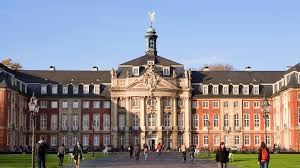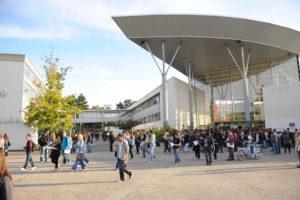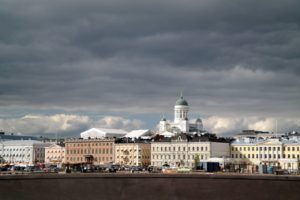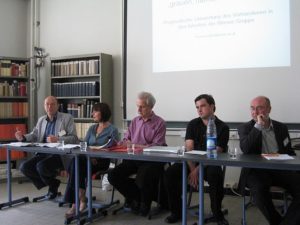
Die historischen Avantgarden definieren sich selbst und werden von uns wesentlich über ihre Bezüge zu diversen Formen von Realismus definiert:
(1) Sie setzen sich zumeist vehement von Realismen des 19. Jahrhunderts ab.
(2) Sie behaupten dabei aber oftmals, einen wahren Realismus (oder Sur-Realismus) zu praktizieren, weil sie der Primärwirklichkeit durch ihre Verfahren näher kämen als traditionelle Künste.
(3) Sie werden dann ihrerseits von Bewegungen wie der Neuen Sachlichkeit, dem Magischen Realismus, Spielarten politischer oder auch populärer, marktkonformer Kunst abgelöst, die ebenfalls behaupten, wieder ‚realistischer‘ zu werden und sich der Wirklichkeit zuzuwenden.
(4) Noch die Neo-Avantgarden und andere Strömungen von der 2. Hälfte des 20. Jahrhunderts bis heute müssen sich immer wieder im Verhältnis zu Formen von Realismus verorten (z.B. bezeichnet Mario Amaya Pop als „the New Super Realism“).
Die Tagung untersuchte die unterschiedlichen Formen von ‚Realismus‘, die durch die Avantgarden (und gegen sie) entworfen werden, und damit nach Formen des Wirklichkeitsentwurfes und -bezuges von Kunst, Programmatik und Medien. ‚Realismus‘ kann sich dabei auf Verfahren (prijom) ebenso beziehen wie auf Diskurse, auf die Repräsentation von Wissen (etwa der Naturwissenschaften oder der Esoterik), auf politische Ideologien oder Anwendungen in der Praxis.
Gefragt waren Beiträge aus allen Bereichen der Avantgarde- und Moderne-Forschung zu Kunst, Literatur, Musik, Theater, Architektur, Film, Medien, künstlerischen, sozialen, politischen, philosophischen und esoterischen Bewegungen, Lifestyle, Mode, Design und Technologie.
Keynote Speaker waren EAM-Gründer, Direktor des MDRN research lab und Vorsitzender der Abteilung für Theory and Culturall Studies an der Universität Leuven Sascha Bru zu “Representation and History: Realist and Avant-Garde”, der ehemalige IFK-Direktor Helmut Lethen zu „Unter dem Pflaster ist die Kanalisation oder War das Böse für die historischen Avantgarden das wirklich Reale?“ sowie die Literaturhistorikerin und -theoretikerin Miglena Nikolchina, Professorin am Institut für Literaturtheorie an der Universität Sofia, Bulgarien mit “From the Impossible to the Virtual: Kristeva’s Concept of ‘Signifiance’ and the Returns of the Avant-garde”.
Insgesamt präsentierten 59 Panels mit je 4 Vortragenden ihre Forschungen.
Aus dem Avantgardeforschungsnetzwerk ViennAvant, das mit EAM kooperiert, stellten Laura Tezarek, Helmut Neundlinger, Ingrid Fürhapter und Markus Ender ihre Arbeit vor:
Im Panel 21 NEO-AVANTGARDEN WIEN trug Laura Tezarek von der Universität Wien die Arbeit ihrer Gruppe zu Andreas Okopenkos Lexikon-Roman unter dem Titel „Aus der Lektüre in die Welt“ vor.
Obwohl der Schriftsteller Andreas Okopenko (1930–2010) im österreichischen Literaturbetrieb der zweiten Hälfte des 20. Jahrhunderts eine herausragende Rolle in der Vernetzung der Nachkriegsavantgarde spielt, ist sein Werk bisher noch wenig erforscht worden. Okopenko distanziert sich auf der einen Seite von einer radikaleren Avantgarde wie der „Wiener Gruppe“, grenzt sich aber auch nachdrücklich von reaktionären Tendenzen der Nachkriegsliteratur in Österreich ab und nimmt damit eine Zwischenstellung ein, die sich auch in seinen literarischen Texten widerspiegelt. Insbesondere in seiner Prosa provoziert er in formaler Hinsicht und stellt sich zeitgenössischen Lektüregewohnheiten entgegen. „Ich will Sie […] aus der Lektüre in die Welt befreien“: So beschreibt Okopenko das Ziel seines Lexikon-Romans (1970). Die Textbestandteile des Romans sind alphabetisch nach Schlagwörtern angeordnet, wobei die Lesenden verschiedene Wege durch das rhizomartige Werk wählen können: Linear von A bis Z, „wahl- und gedankenlos“ blätternd, mit dem Würfelspiel eines Kindes oder über Hinweispfeile der Reise des Chemiekaufmanns J. folgend. Aber die letzte Variante ist nur eine unter vielen, weil eine solche Geschichte nicht „die Welt in ihrer Möglichkeitenstruktur, mit all den denkbaren Verzweigungen“ (Okopenko) zeigen würde. In mehreren Essays legt Okopenko sein Verständnis von „Welt“ und „Wirklichkeit“ dar, das im Kontext seiner Auseinandersetzung mit Realitätskonzeptionen der „Wiener Gruppe“ gelesen werden muss. Von dieser trennt ihn der Umstand, dass für ihn „die Übertragung erlebter Primärwirklichkeit im Mittelpunkt“ steht, ein „dichterisches Fangerlspiel mit der Wirklichkeit“, wie es im Lexikon-Roman heißt, das diesen als Mikromodell der Welt vorführen soll. Der Vortrag analysiert Okopenkos Realitätsverständnis, wie es sich im Lexikon-Roman zeigt, im Kontext der österreichischen Nachkriegsavantgardeliteratur. Bezug genommen wird u.a. auf noch auf unveröffentlichte Dokumente aus Okopenkos Nachlass im Literaturarchiv der österreichischen Nationalbibliothek, um tiefere Einblicke in die Entstehung dieses Romans zu erhalten.
Helmut Neundlinger von der Donau Uni Krems untersuchte in seinem Vortrag „Revolutionäre (Anti-)Realisten“ Schreiben als Protestarbeit an der Wirklichkeit bei Bernward Vesper und Oswald Wiener.
Bernward Vespers Fragment gebliebener Roman-Essay Die Reise und Oswald Wieners die verbesserung von mitteleuropa, roman attackieren die politischen und ästhetischen Zurichtungen der Wirklichkeit mit jeweils unterschiedlichen Mitteln. Nimmt man die Zeitgeschichte bzw. die lebensweltlichen Umstände der beiden Autoren in den 1960ern in den Blick, erscheint die ironisch-verzweifelte Militanz ihrer Sprache zunächst als radikal antirealistisches Programm: Die Romanform wird gesprengt und umgeformt in unterschiedliche Techniken der Sezierung (bei Wiener Aphorismus, Kalauer, Selbstbeobachtung, bei Vesper Cut up, Rauschprotokoll, Selbstkritik). Die Auflösung / Sprengung betrifft in letzter Konsequenz das Subjekt als Wahrnehmungs-, Empfindungs- und Wirklichkeitsform. Auf den Trümmern dieser Resonanzkatastrophe wächst ein neuer, in vielerlei Hinsicht anderer Zugriff auf das Wirkliche. Es erscheint gleichsam als Utopie, als Versprechen, das sich im Denken und Schreiben bereits realisiert. Vespers permanenter Drogen- Selbstversuch konterkariert die klassische Bildungsreise und entwickelt sich zum Protokoll einer Suche nach einer neuen, umfassend erweiterten Realität. Oswald Wiener wiederum forscht im Kapitel zum „konzept des bio-adapters“ nach einer Erweiterung der Erkenntnisinstrumente, mit denen die Grenzen des Fühlens und Denkens überwunden werden können. Eine vergleichende Lektüre dieser beiden epochalen Texte der deutschsprachigen Avantgarde-Prosa der späten 1960er Jahre soll die Unterschiede, aber auch Überschneidungen zwischen dem K1- und R.A.F.-Milieu bzw. dem Umfeld des Wiener Aktionismus aufzeigen und verdeutlichen, inwiefern Wiener und Vesper innerhalb dieser subkulturellen Mikrokosmen wiederum Partisanen-Positionen einnehmen.
Den beiden wurden im Panel NEO-AVANTGARDEN WIEN Lehel Sata von der Universität Pécs mit ihrem Vortrag „ jetzt ist was ich denke”. Zum Realismus-Begriff der Wiener Gruppe. Und die Isländerin Sólveig Guðmundsdóttir, die derzeit an der Universität Münster forscht, mit „Transgressing Boundaries. Aspects of Reality in Otto Muehl’s Oeuvre” zur Seite gestellt.
Im Panel 57 „EXPRESSIONISMUS präsentierten die ViennAvant-Mitglieder Markus Ender und Ingrid Fürhapter, Universität Innsbruck, unter dem Titel „Vom Wissen um die „wahre Wirklichkeit“ und die „geistigen Realitäten“. Wirklichkeitsentwürfe und Realismuskonzepte im Umfeld von Bruno Adlers Utopia.“ Dokumente der Wirklichkeit und Ludwig von Fickers Zeitschrift Der Brenner.
Im Vorwort der programmatischen Schrift Utopia. Dokumente der Wirklichkeit (1921) verweist deren Herausgeber Bruno Adler auf eine neue Bewegung, derer „die Zeit bedarf […]: die ‚Brenner‘-Bewegung.“ Gemeint ist die Gruppierung rund um die von Ludwig von Ficker herausgegebene Innsbrucker Kulturzeitschrift Der Brenner (1910–1954), die, zunächst als Avantgarde-Sprachrohr konzipiert, sich nach dem Ersten Weltkrieg im Rückgriff auf die Philosophie Kierkegaards sowie auf Ferdinand Ebner (Das Wort und die geistigen Realitäten. Pneumatologische Fragmente (1921)) im Sinne einer geistigen Erneuerung repositionierte. Adler beabsichtigte eine Kooperation mit Ficker und anderen Brenner-Mitarbeitern (Dallago, Haecker und insbesondere mit Ebner, der bereits 1919 über den Komponisten Josef Matthias Hauer den Maler Johannes Itten kennengelernt hatte); sein Interesse lag darin begründet, dass er Gemeinsamkeiten im Konzept der Utopia und dem Brenner sah. Zu einer Zusammenarbeit kam es jedoch nicht, Ebner und Ficker distanzierten sich schnell. Der Vortrag möchte unter Einbeziehung des umfangreichen Ficker-Briefwechsels zunächst der Frage nachgehen, weshalb Adler 1919/20 den „Brenner“ – ein Periodikum aus der kulturellen Peripherie abseits der Zentren – als Orientierungsgröße ansah. Zudem soll umrissen werden, welche Realismus- und Wirklichkeitsbegriffe im Zuge der kurzen Kontaktphase zwischen dem Bauhaus- Umfeld und der Brenner-Gruppe zur Sprache kommen und weshalb eine Kooperation nicht möglich war. Von beiden Seiten wird nach dem Krieg die Notwendigkeit „einer neuen wahren Welt der Formen und Sinne“, d.h. einer „neuen Wirklichkeit“ propagiert, doch auf formaler wie inhaltlicher Ebene weichen die Konzepte erheblich voneinander ab. Während die Kunst in Utopia als eine vom Menschen sich selbst gestellte Aufgabe im Sinne einer schöpferischen Tat interpretiert wird und sie dadurch – in Abgrenzung von „ekstatischen Konfessionen und Gebärden“ und trotz gleichzeitiger Betonung des Geistigen bzw. fast Esoterischen – eine Form von Immanenz betont, findet im Brenner zunehmend eine Hinwendung zu christlich-philosophischer Transzendenz statt, die explizit als Botschaft an die sündenbeladene Welt gerichtet ist.
Ihr Panel „EXPRESSIONISMUS“ wurde von den Vorträgen von Fabian Lutz, Universität Freiburg, „Wohl weiß ich, daß der Leib des Paralytikers verfällt“ Expressionistische Krankheitsnarrative zwischen realistischer Selbstdiagnose und existentiellem Erleben sowie von Sebastian Schmitt, Schwabe-Verlag, Marburg, „Vom Realismus moderner Übersetzungen. Albert Ehrensteins Nachdichtungen „frei nach dem Chinesischen“ ergänzt.



